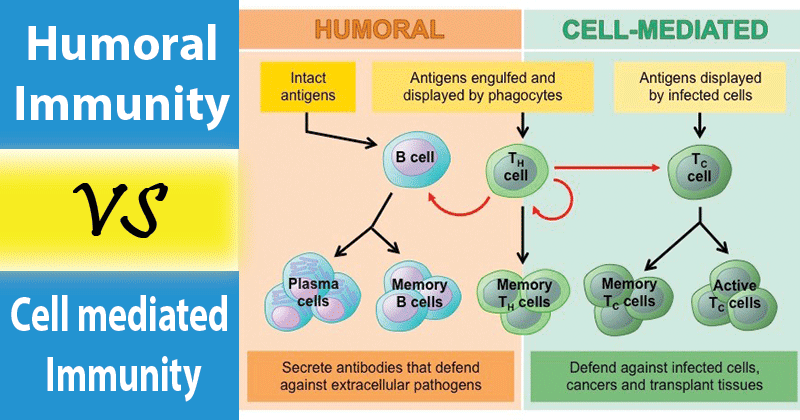
Image Source: Pinterest.
Interesting Science Videos
Here are some differences:
S.N. |
Characteristics |
Humoral Immunity |
Cell-mediated Immunity |
| 1. | Definition | The immunity mediated by macromolecules found in the extracellular body fluids is called humoral immunity. (“humor” a medieval term for body fluid) | The immunity that identifies and destroys infected cells in the body is called cell-mediated immunity. |
| 2. | Mediator | The main cell involved in humoral immunity are B-cells. | The main cell involved in cell-mediated immunity are T-cells. |
| 3. | Components | B cells, T cells, and macrophages. | Helper T cells, cytotoxic T-cells, natural killer cells, and macrophages. |
| 4. | Pathogen | The humoral immunity protects against extracellular pathogens and also their toxin. | The cell-mediated immunity protects against intracellular pathogens. |
| 5. | Pathogen recognition | Recognize antigens or pathogens that are circulating in the lymph or blood. | It responds to any cell that displays aberrant MHC markers, including cells invaded by pathogens, tumor cells, or transplanted cells. |
| 6. | Antigen detectors | Phagocytes and antibodies themselves are used to detect antigens. | Receptors and MHC molecules on the cell surfaces are used to detect antigens. |
| 7. | Antigen Binding | B-cells produce antibodies and the antibodies bind to antigens. | T-cell receptors on cells bind to T-cells which in turn bind to antigens. |
| 8. | Antigen Processing | Do not require the processing of antigens. | Antigens must be processed and presented for T-lymphocyte mediated response. |
| 9. | Receptor Involved | It involves B-cell receptors (BCRs). | It involves T-cell receptors (TCRs). |
| 10. | Accessory surface receptors/molecules | Igα, Igβ, Fc receptors, CD40, CD21 | CD3 molecular complex
Dimer of ∑ chain, CD4, CD8, CD2, CD28, integrins |
| 11. | Type of T-cell involved | Only the T helper cell (CD4+) is involved. | Both CD4+ and CD8+ T cells are involved. |
| 12. | Antibodies formation | Antibodies are formed in a humoral response. | Antibodies are not formed in a cell-mediated immune response. |
| 13. | Onset | The onset is rapid. | The onset is delayed. |
| 14. | Result | The end result of the activation is the differentiation of plasma B-cells, secreting antibodies. | The end result of the activation is the secretion of cytokines. |
| 15. | Protection against | Extracellular bacterial or viral pathogens. | It protects against fungus, viruses, and intracellular bacterial pathogens. |
| 16. | Immunological surveillance | It does not provide immunological surveillance. | It provides immunological surveillance. |
| 17. | Hypersensitivity reactions | Hypersensitivity type I, II, and III is mediated by humoral immunity. | Hypersensitivity type IV is mediated by cell-mediated immunity. |
| 18. | Role in Organ transplantation and Grafting | It may be involved in early graft rejection due to preformed antibodies. | It participates in rejections of organ transplants. |
| 19. | Immunity against cancer | It does not provide immunity against cancer. | As it destroys the tumor and cancerous cells, it provides protection against cancer. |
| 20. | Assessment method | From plasma level of antibodies | Skin test for the development of delayed-type of hypersensitivity |
References
- http://www.differencebetween.net/science/difference-between-humoral-and-cell-mediated-immunity/
- http://www.easybiologyclass.com/difference-between-cell-mediated-and-humoral-immunity-comparison-table/
- https://www.researchgate.net/publication/320180727_Difference_Between_Humoral_and_Cell_Mediated_Immunity
- http://howmed.net/pathology/comparison-of-humoral-and-cell-mediated-immunity/
- https://medicscenter.com/humoral-vs-cell-mediated-immunity/

Thankyou so much. It was so helpful to me.
Appreciate
it was so helpful. Thanks a lot.
Very informative